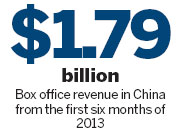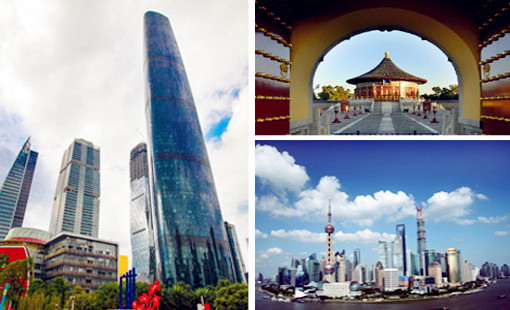Movie tax flack is settled
Updated: 2013-08-15 11:14
By Wang Jun in Los Angeles, Zhang Qidong in San Francisco and Liu Wei in Beijing (China Daily)
|
||||||||
|
A Chinese man walks past a poster promoting a Hollywood movie outside of a cinema in Beijing on Wednesday. Mark Ralston / AFP |

Government steps in to end months of haggling with Hollywood execs
China and Hollywood studios have reached an agreement that allows the American companies to recover more than $150 million of revenue-sharing box office receipts, ending an almost half-year-long dispute in the world's fastest growing movie market.
The Motion Picture Association of America Inc issued a statement late Tuesday from its chairman and CEO Chris Dodd saying that the Chinese government had intervened in the dispute between US movie companies and China Film Group Corp, the dominant distributor of foreign movies in the country.
The American businesses will get back the owed revenue in full and the payment process has started, Dodd said.
"The US and Chinese film industries enjoy a close and productive relationship and the MPAA is grateful to our counterpart, the State Administration of Press, Publication, Radio, Film and Television (SAPPRFT), for their commitment in resolving this matter favorably," said Dodd, who had served in Congress for 38 years, including 30 years as the Democrat Senator from Connecticut.
Jiang Defu, spokesman for China Film Group Corp, said his company would implement the government's decision and declined further comment.
China sets a limit on the number of foreign movies that can be shown in the world's most populous country and second-largest economy. That quota was 20 movies a year. When Xi Jinping - then vice-president and now president of China - visited the US in February 2012, both countries agreed to increase the number to 34 and increase foreign movie companies' share of box office revenue from 13 percent to 25 percent.
Beginning in 2012, China started trial tax reforms in Shanghai to reduce burdens on companies in transport and service sectors, including movie production and distribution, by replacing a business tax with a value-added tax, whose rate was much lower. The measure was then expanded to 10 other regions, including Beijing, where China Film Group Corp is based.
The Chinese film production and distribution company was preparing for an initial public offering and was especially sensitive to any change in its profitability, so it negotiated with Hollywood studios, asking them to pay the 2 percent value-added tax alone.
Based on its success, the Chinese government announced in April it would expand the tax reform to nationwide. At the same time, the dispute between Hollywood and the distributor went public and intensified, as China Film Group stopped paying Hollywood movie companies.
Depending on different sources, the money owed was between $150 million and $200 million. Hollywood studios started intensive lobbying in the US and China.
The dispute was finally submitted to top levels of the Chinese government and ended with a favorable decision for the administration and the Hollywood studios.
Janet Yang, a Chinese American producer, applauded the end of the deadlock.
She said the dispute would not hurt the long-term cooperation between Hollywood studios and China Film Group. But, she cautioned, both sides are big players in the industry and cannot afford to lose each other, so they should be more flexible and open in their dealings in the future.
Stanley Rosen, director of East Asian studies at the University of Southern California and a specialist in Chinese politics, film and society, said that it is clearly in the interest of all sides to solve this problem as soon as possible, especially after The Hollywood Reporter published their original story, which said that from Hollywood's understanding, this was in violation of an agreement made by Xi Jinping himself when he was in Los Angeles.
"It's also clear that there is a dispute not just between Hollywood and China but within China between various bureaucracies, notably SAPPRFT and the tax bureau, and that means it has to be decided higher up, at the State Council level," he said.
China is the second-largest movie market in the world with a box office of about $1.79 billion in the first six months of 2013 - 36 percent higher than the same period last year. It is also one of the most important markets for Hollywood studios.
Many US studios and producers have incentive to increase their partnerships with Chinese companies, producers and actors - to get a bigger piece of the pie.
According to Chinese rules, if a movie qualifies as a Sino-foreign joint production, the foreign partner gets 43 percent of the box office, instead of 25 percent. To qualify, one third of the investment must come from Chinese companies and at least one main character has to be played by a Chinese actor.
Movie tycoon Steve Spielberg, who is promoting his 3-D Jurassic Park in China now, recently expressed his hope to work on such a joint effort.
In a telephone interview with China Daily, he said he would be highly interested in working with his "dear friend" Zhang Yimou on an international film in China.
Zhang, director of the opening ceremonies for the Beijing Olympic Games and award-winning films such as To Live and Raise the Red Lantern, was in Los Angeles in May and met with Spielberg, where they had discussions about working together on a film.
Contact the writers at wangjun@chinadailyusa.com, kellyzhang@chinadailyusa.com and liuw@chinadaily.com.cn
(China Daily USA 08/15/2013 page1)

 Spielberg has desire to work with Zhang Yimou
Spielberg has desire to work with Zhang Yimou
 Requiem ceremony for former comfort woman
Requiem ceremony for former comfort woman
 Egypt forces crush protesters
Egypt forces crush protesters
 Two killed in fiery crash of UPS cargo jet
Two killed in fiery crash of UPS cargo jet
 Yao dreams of sports for fun with towering charity
Yao dreams of sports for fun with towering charity
 Re-enacting ancestors' journey to the west
Re-enacting ancestors' journey to the west
 Special bus seat for breast-feeding mothers
Special bus seat for breast-feeding mothers
 Northern exposure
Northern exposure
Most Viewed
Editor's Picks

|

|

|

|

|

|
Today's Top News
China will overtake US as world's No 1 consumer
Chinese pesticide producers eye US
Movie tax flack is settled
US asks China's help on DPRK rights issues
Gold rises on physical buying from Asia
Snowden case not to affect US-Russia talks
Abe rules out visit to Yasukuni shrine
Over 200 dead after Egypt forces crush protesters
US Weekly

|

|





